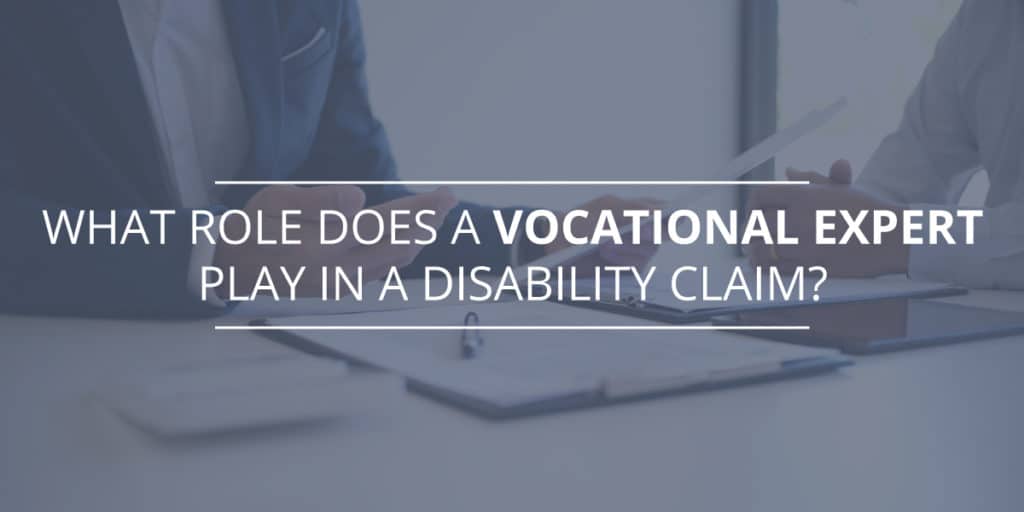
If you are in the process of applying for disability benefits, you may be a bit confused by the entire system. Like most federal government agencies, the Social Security Administration (SSA) has an overwhelming number of rules, regulations — and acronyms. Understanding more about the system can help you as you go from initial application to a final decision on your application.
Approximately 28% of applications for Social Security Disability Insurance (SSDI) benefits are approved after an initial application. If the initial application is denied, then a claimant can then file a request for reconsideration. If this request is also denied, then a claimant can file a request for a Social Security Disability hearing; at this stage, a vocational expert may come into play.
Vocational experts are present at many — but not all — hearings before the SSA. These experts play an incredibly important role in the hearing, helping the administrative law judge (ALJ) make a final decision on a claimant’s application. Read on to learn more about what exactly a vocational expert is — and what they will do at your hearing.
What Is a Vocational Expert?
A vocational expert is an expert witness qualified by the SSA. They are not attorneys. Although they are paid by the SSA, they are considered impartial — not favoring either side at the hearing.
A vocational expert provides opinion evidence at an appeals hearing that will be considered by an ALJ when making a decision about a disability. They do not interact with claimants or question them during a hearing.
Vocational experts usually have college degrees and substantial experience in the field of vocational rehabilitation. They are qualified to provide evidence based on:
- Knowledge of and experience with current industrial and occupational trends and local labor market conditions;
- An understanding of how the SSA determines whether a claimant is disabled;
- Involvement in or knowledge of vocational counseling and job placement of adult workers with disabilities into jobs;
- Knowledge of and experience using vocational reference sources that the SSA has officially recognized, which includes the Occupational Outlook Handbook, County Business Patterns and Census reports, and the Dictionary of Occupational Titles.
In essence, vocational experts have knowledge and experience on vocational rehabilitation, vocational and earning capacity, cost of replacement labor, lost earnings, and lost ability and time in performing household services.
The Role of a Vocational Expert at a Disability Benefits Hearing
A vocational expert is called in called in cases where a denial of disability benefits has been appealed. An ALJ will usually call a vocational expert to provide evidence about whether a claimant can do their past work or other work. Before the hearing, the expert will be given the exhibits from the case, and will review the claimant’s past work history.
At a hearing, the ALJ will question a vocational expert, and then the applicant and his or her representative will have the opportunity to question the expert. The ALJ will frame their questions as a hypothetical, such as “Assume that an individual has the same age, education, and work experience as the claimant…”. The ALJ will then add various limitations, such as an inability to sit or stand for a certain period of time, and ask the expert’s opinion about — whether the individual could still do his or her past relevant work.
The vocational expert will provide an answer about whether the hypothetical individual can perform the previous work as described by the ALJ. If the hypothetical individual cannot perform the past work, then the expert will consider whether there are any other jobs that he or she could do.
When an applicant’s attorney questions the vocational expert, their goal will be to get the expert to rule out these other jobs. This is done through adding limitations that may have been excluded from the hypothetical posed by the ALJ. If the vocational expert ultimately says that the hypothetical individual cannot perform any jobs, then it may result in a favorable ruling for the applicant.
How a Cherry Hill Disability Benefits Attorney Can Help
A vocational expert offers evidence on vocational rehabilitation and a claimant’s ability to do past relevant work at a Social Security Disability hearing. Because an ALJ’s questions to a vocational expert might be somewhat limited, the role of a disability attorney is particularly important. Your lawyer can thoroughly question the expert using information about your functional limitations until he or she testifies that you are not able to perform past work or any other jobs.
Bross & Frankel represents clients seeking disability benefits in Pennsylvania and New Jersey. For more than two decades, we have helped clients get the benefits that they deserve. To schedule a free claim review or to learn more about how we can help you, contact our office today at 856-795-8880, or reach out to us online.

Rich Frankel is the managing partner of Bross & Frankel. He is a member of the New Jersey and Pennsylvania bars. He has focused exclusively on disability and social security benefits since 2005.
Mr. Frankel joined what is now Bross & Frankel after having watched his father struggle with disability, fighting a lengthy illness. Mr. Frankel founded the firm’s veteran’s law practice and substantially grew the social security disability practice, focusing Bross & Frankel’s ability to fight for all of the disability benefits available to his clients.
Mr. Frankel additionally fights for clients in court, obtaining frequent victories in Social Security appeals and against insurance companies in Federal court.